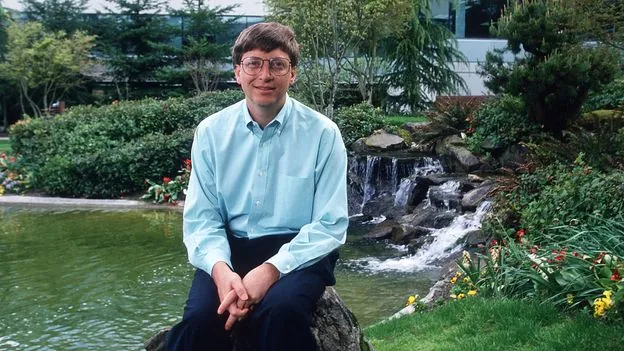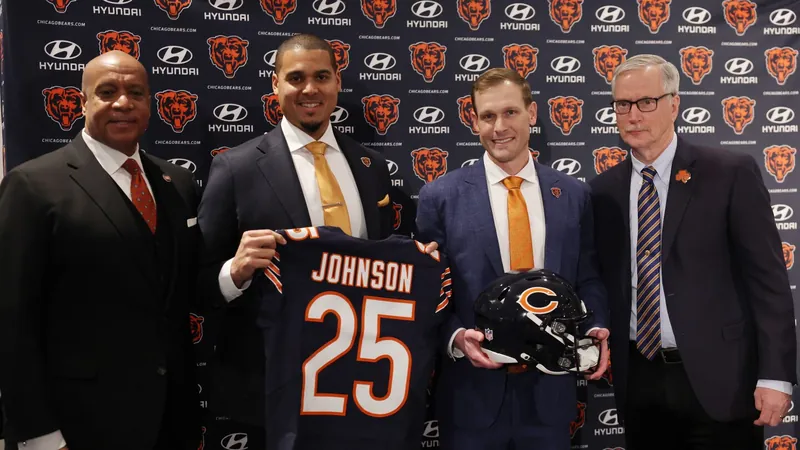
Bill Gates' Bold Vision for the Internet in 1993: A Glimpse into the Future of the Information Age
2025-03-31
Author: Wai
Introduction
In a remarkable interview with the BBC in June 1993, Bill Gates, the co-founder of Microsoft, unveiled a captivating vision of the digital future. At the time, the internet had relatively few users, with only about 130 websites existing worldwide. Gates articulated his belief that we were entering 'the information age,' highlighting that computers and software would redefine how people interact with information.
'The computer is the tool of the information age, and software will determine how easily we can access that information,' Gates stated, foreseeing the monumental impact that digital technologies would have on society, economics, and everyday life.
The Early Days of Microsoft
In the early days of Microsoft, Gates and his co-founder Paul Allen dreamt of putting a computer on every desk and in every home. Their journey began in a private school in Seattle, where their shared fascination with computers sparked the idea of Microsoft — named for its microcomputer software. The company took off in 1980 when it secured a contract with IBM to produce an operating system for their personal computers, allowing them to license the software to other manufacturers.
Despite facing significant challenges, Gates and Microsoft thrived in the ensuing years, helping to create an ecosystem of 'IBM-compatible' PCs powered by their MS-DOS operating system.
Bill Gates and Paul Allen
While Gates was the quintessential tech visionary, Allen was known for his creative flair. Though he left Microsoft in 1983 due to health issues, he became a renowned venture capitalist and philanthropist. Notably, he owned the NBA's Portland Trail Blazers and the NFL's Seattle Seahawks, demonstrating that his interests extended far beyond technology.
The Shift Toward Multimedia
As the 1990s progressed, Microsoft shifted its focus toward multimedia and enhancing user experiences. Gates acknowledged, 'The home will be a tougher frontier to conquer,' but he remained optimistic about the future significance of computers in daily life. He projected that within 15 to 20 years, computers would become universal household items, though they would not resemble current models.
Gates’ Predictions and Streaming Services
Fast forward to today, and Gates’ predictions have proven prescient. He discussed televised content's expansion into a future potentially offering viewers thousands of channels. His team's vision began to materialize with innovations resembling today’s streaming services. Nathan Myhrvold, then Chief Technology Officer at Microsoft, discussed an 'online interactive guide' capable of personalizing content based on viewers' preferences.
Privacy Concerns
However, this shift toward convenience came with its own challenges. Denise Caruso, the editor of *Digital Media*, cautioned against the risks to personal privacy, emphasizing the implications of a world where content consumption could easily inform third parties about our preferences, financial information, and more.
The Emergence of Email
The idea of email also made its first major appearance in this context, as Microsoft recognized its potential to connect people instantly across the globe. As 1993 drew to a close, the number of websites had surged to over 600, rapidly growing as more users embraced the internet.
The Internet Tidal Wave
In a pivotal moment in 1995, Gates became aware of the internet's potential, famously dubbing it the 'Internet Tidal Wave.' This realization led to the launch of Microsoft's web portal, MSN, and Internet Explorer, solidifying the company's stake in the burgeoning web.
Conclusion
Bill Gates’ insights from 1993 not only anticipated significant technological advancements but also highlighted pressing concerns related to privacy and the commodification of information. His pioneering spirit and vision have shaped the digital landscape we navigate today, making his predictions an enduring reference point in discussions surrounding the ever-evolving realm of technology.
As we continue to navigate this unprecedented information age, Gates' early reflections remain profoundly relevant, reminding us of the complexities and opportunities that come with technological advancement.


 Brasil (PT)
Brasil (PT)
 Canada (EN)
Canada (EN)
 Chile (ES)
Chile (ES)
 Česko (CS)
Česko (CS)
 대한민국 (KO)
대한민국 (KO)
 España (ES)
España (ES)
 France (FR)
France (FR)
 Hong Kong (EN)
Hong Kong (EN)
 Italia (IT)
Italia (IT)
 日本 (JA)
日本 (JA)
 Magyarország (HU)
Magyarország (HU)
 Norge (NO)
Norge (NO)
 Polska (PL)
Polska (PL)
 Schweiz (DE)
Schweiz (DE)
 Singapore (EN)
Singapore (EN)
 Sverige (SV)
Sverige (SV)
 Suomi (FI)
Suomi (FI)
 Türkiye (TR)
Türkiye (TR)
 الإمارات العربية المتحدة (AR)
الإمارات العربية المتحدة (AR)